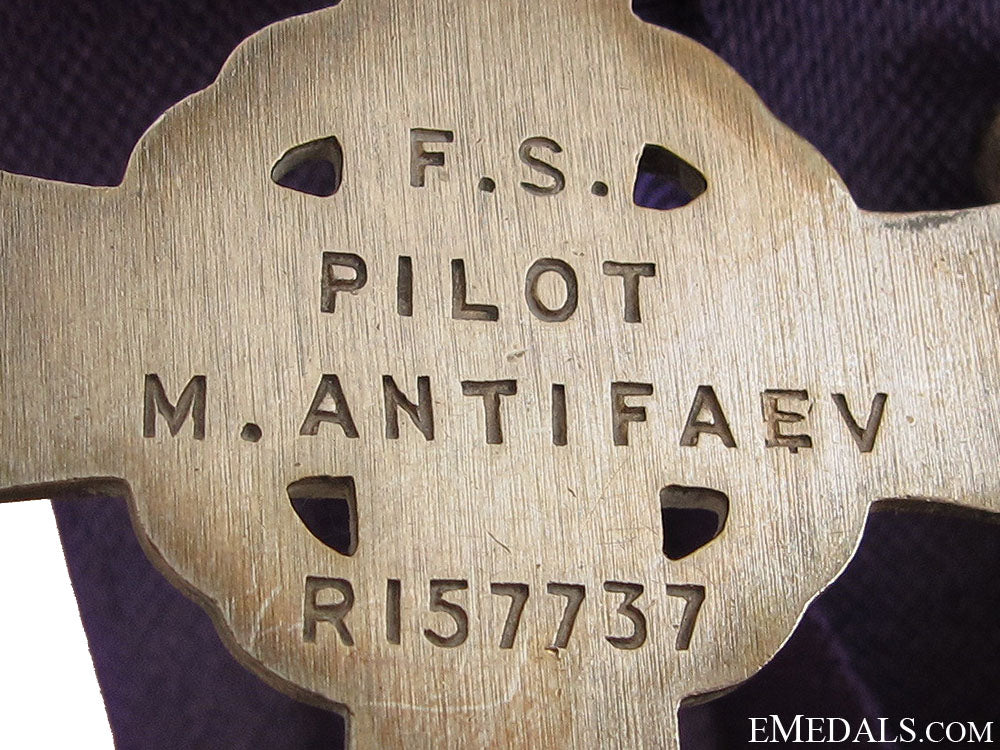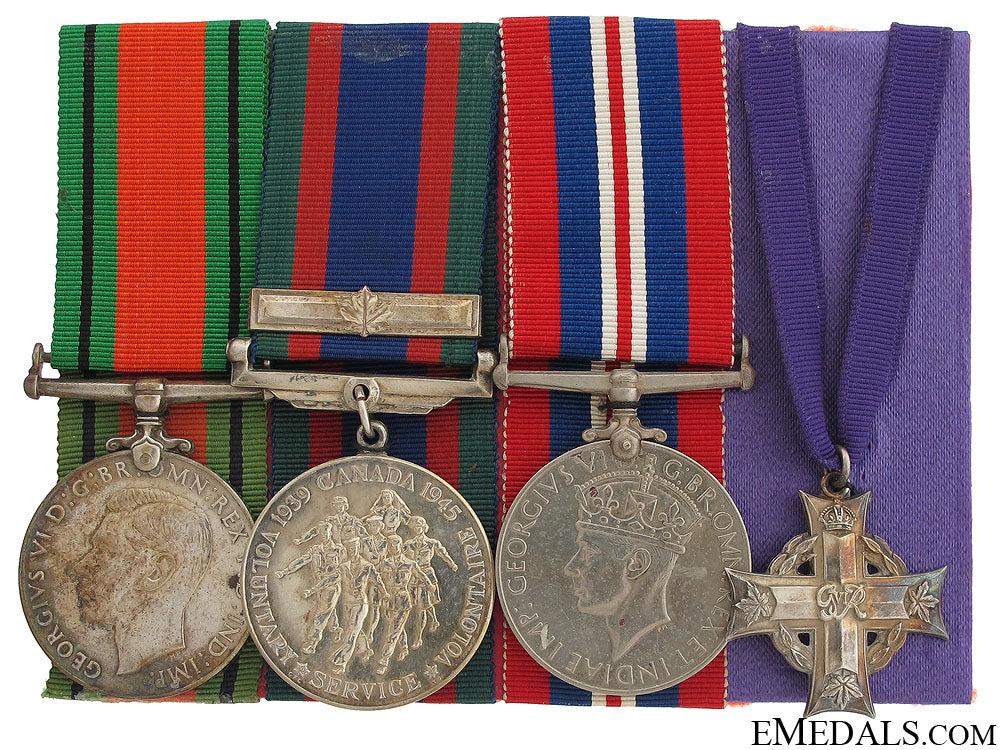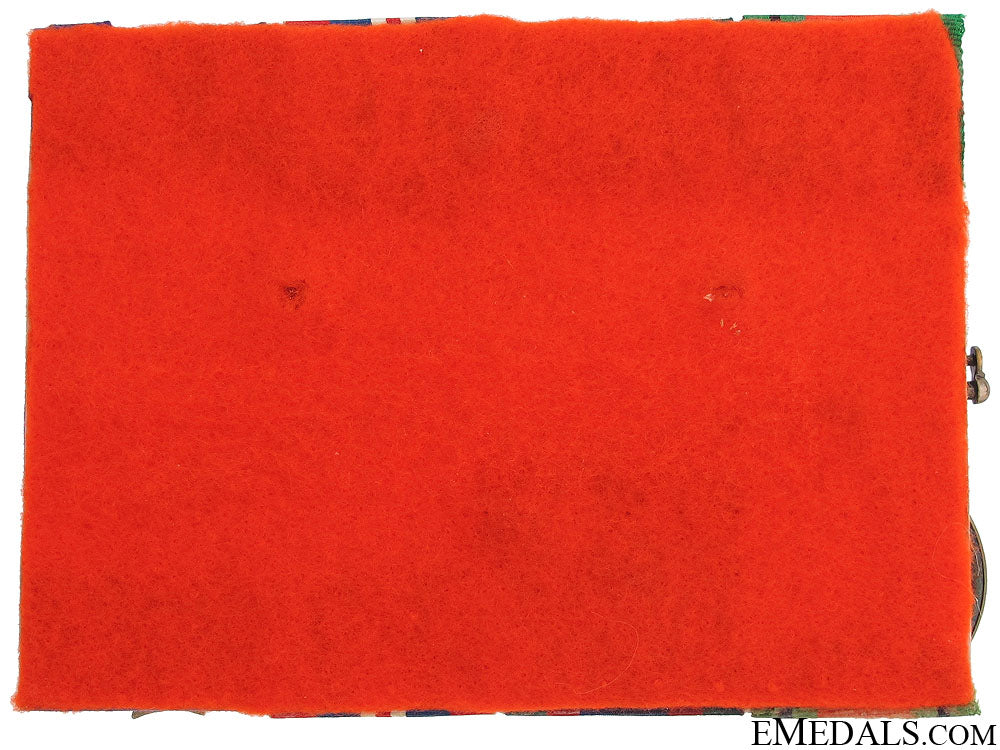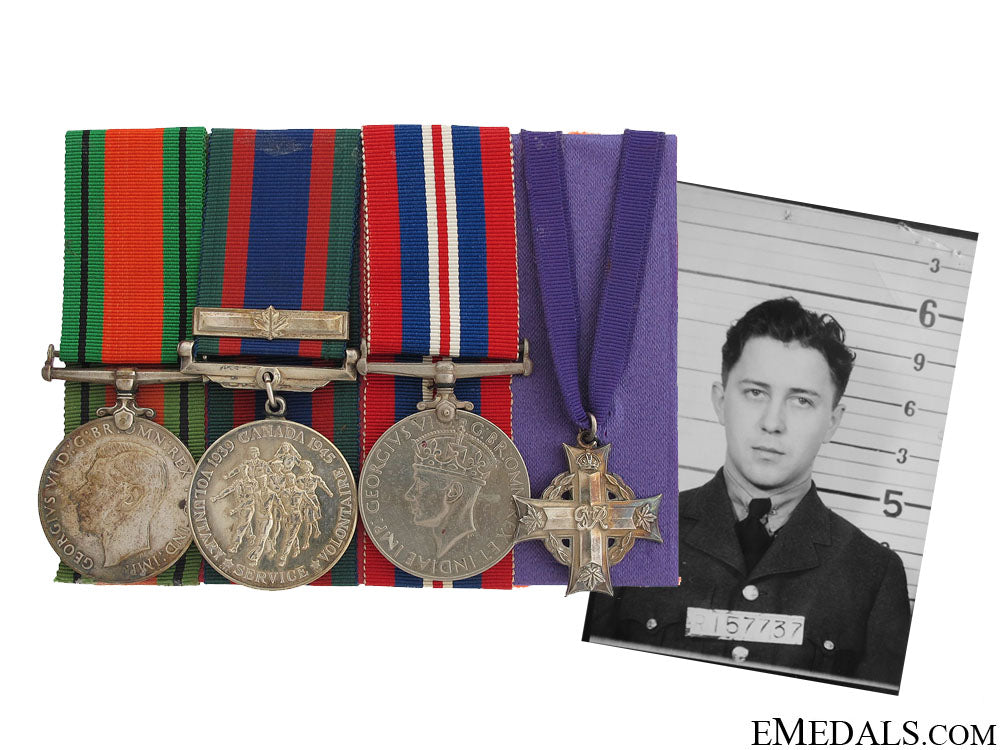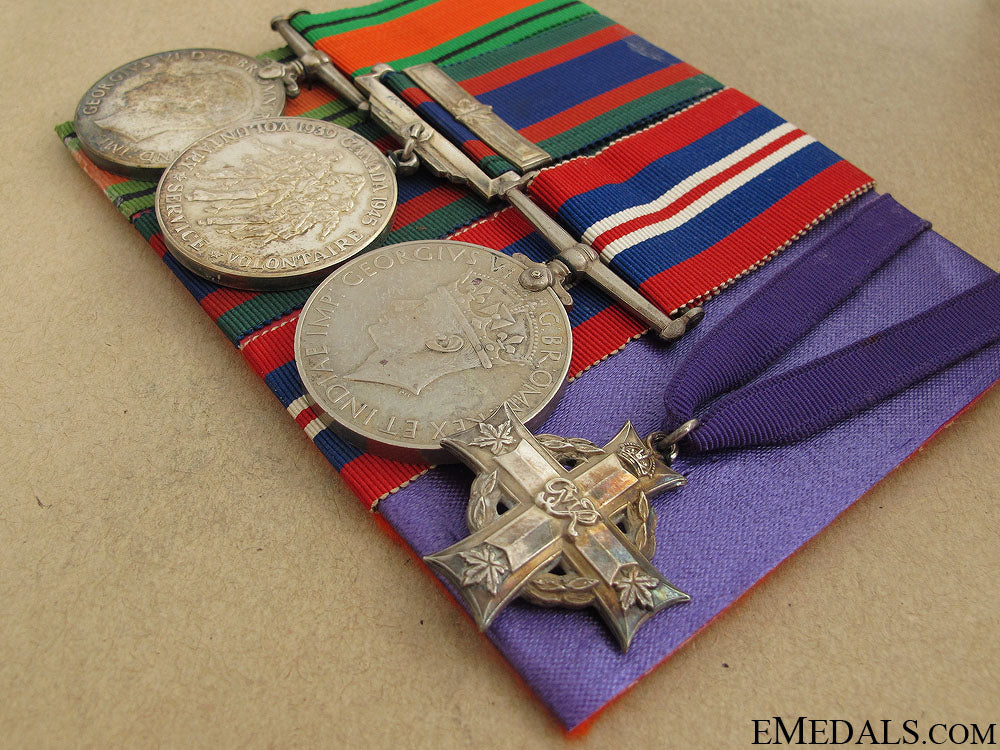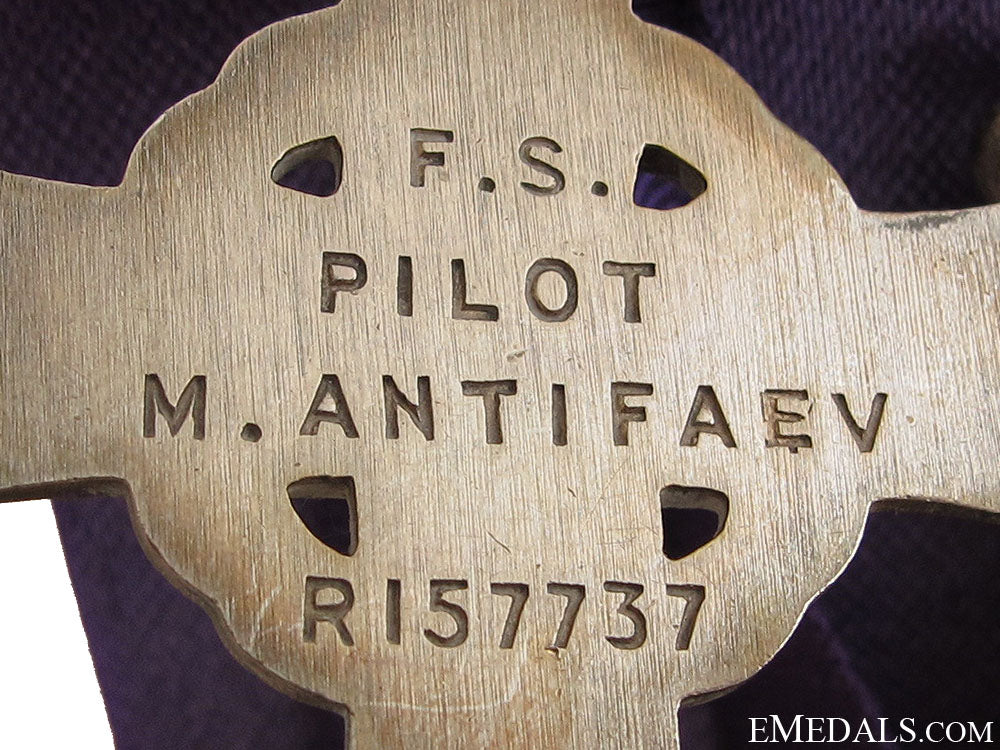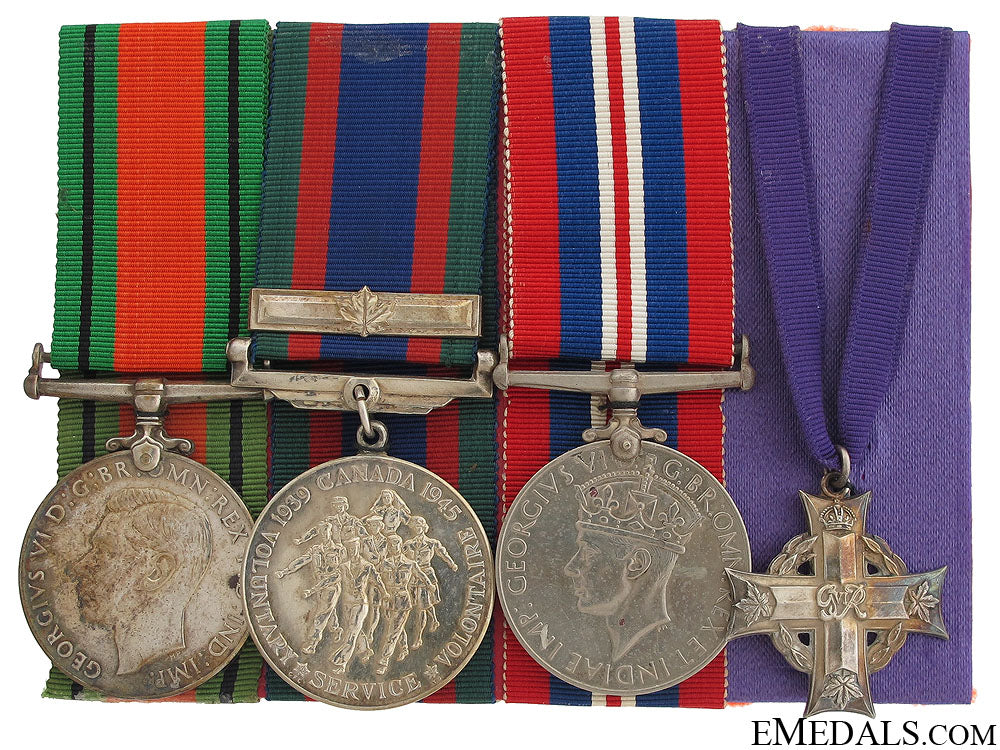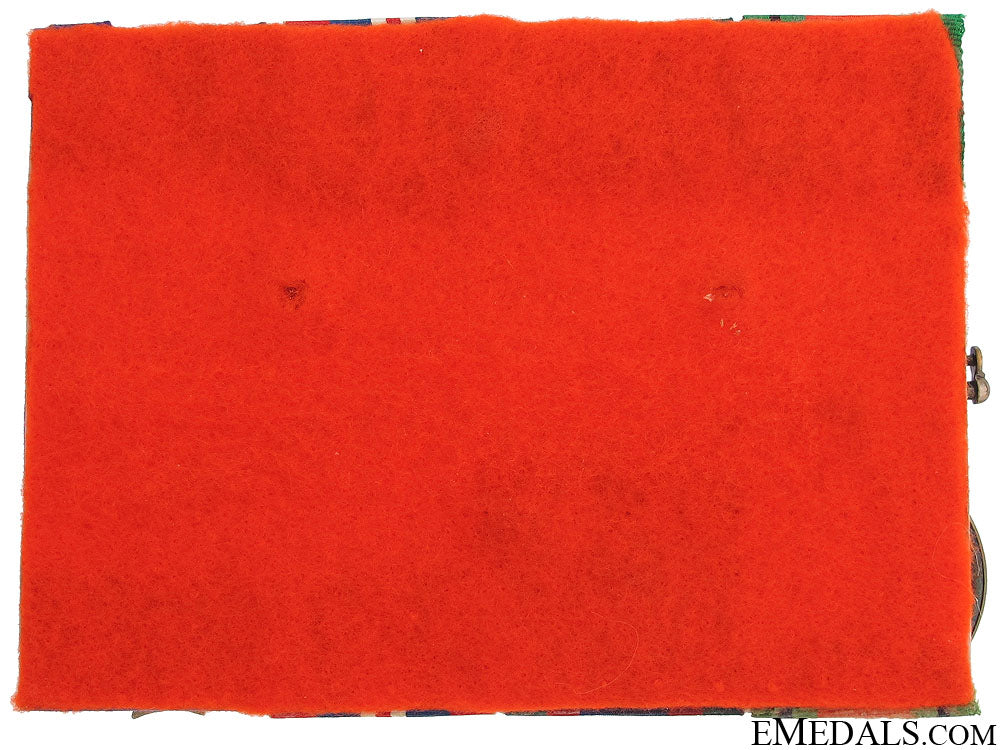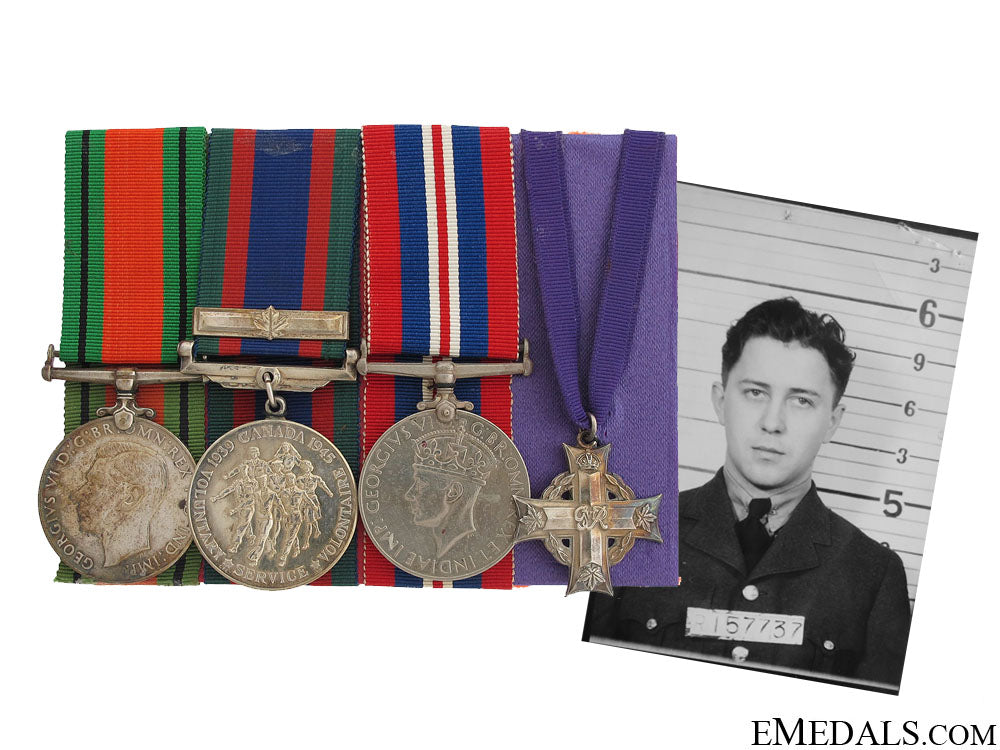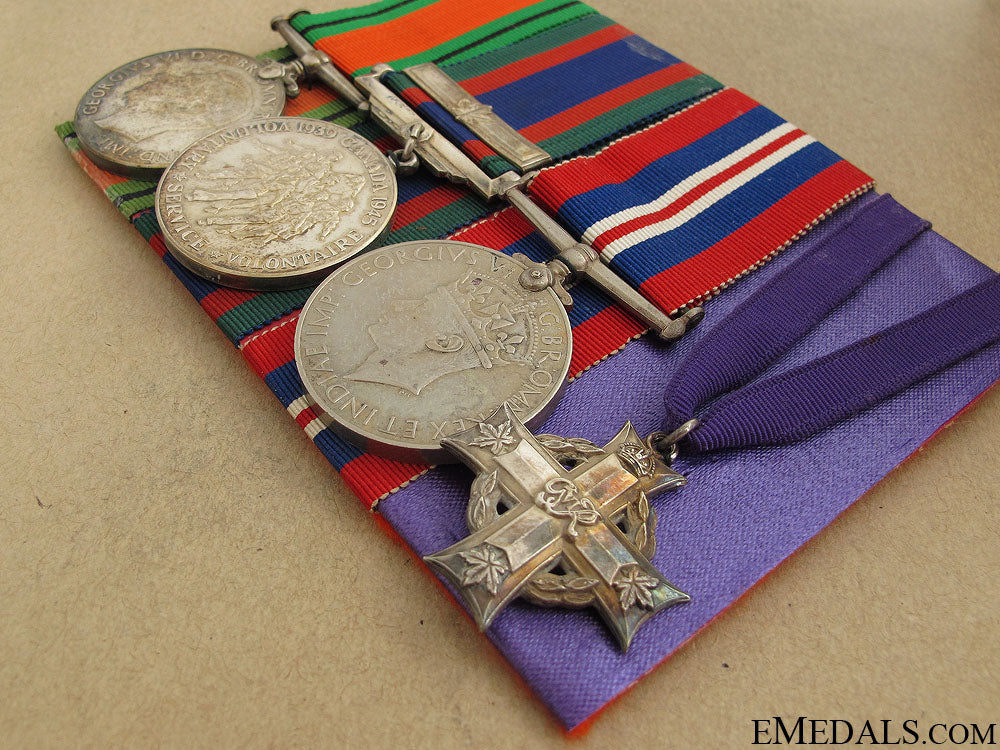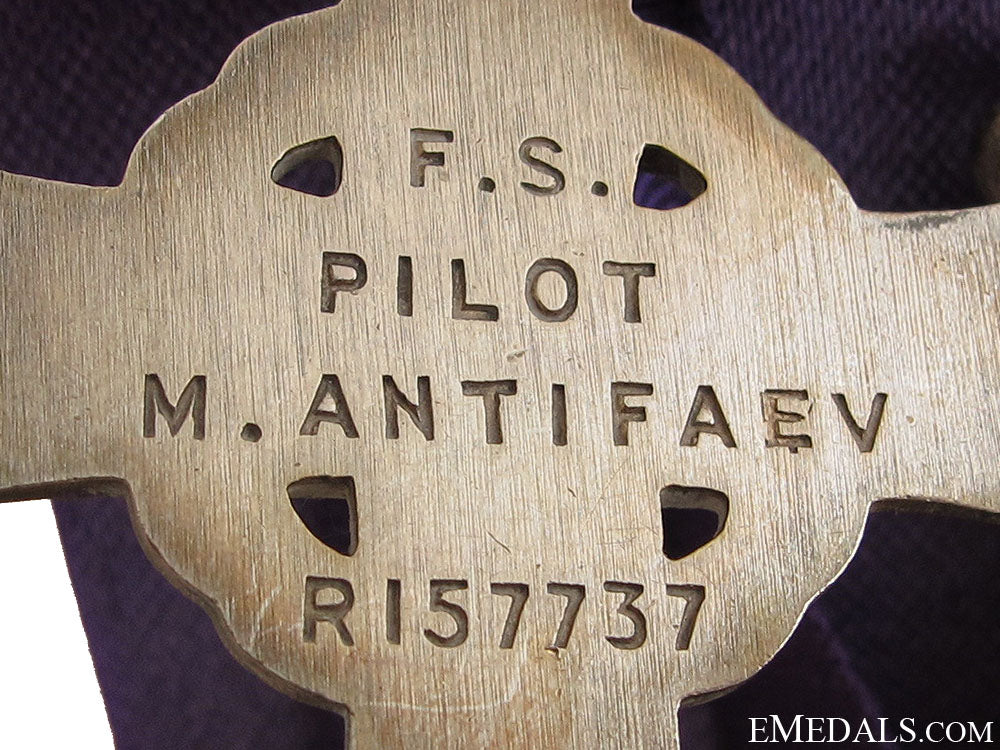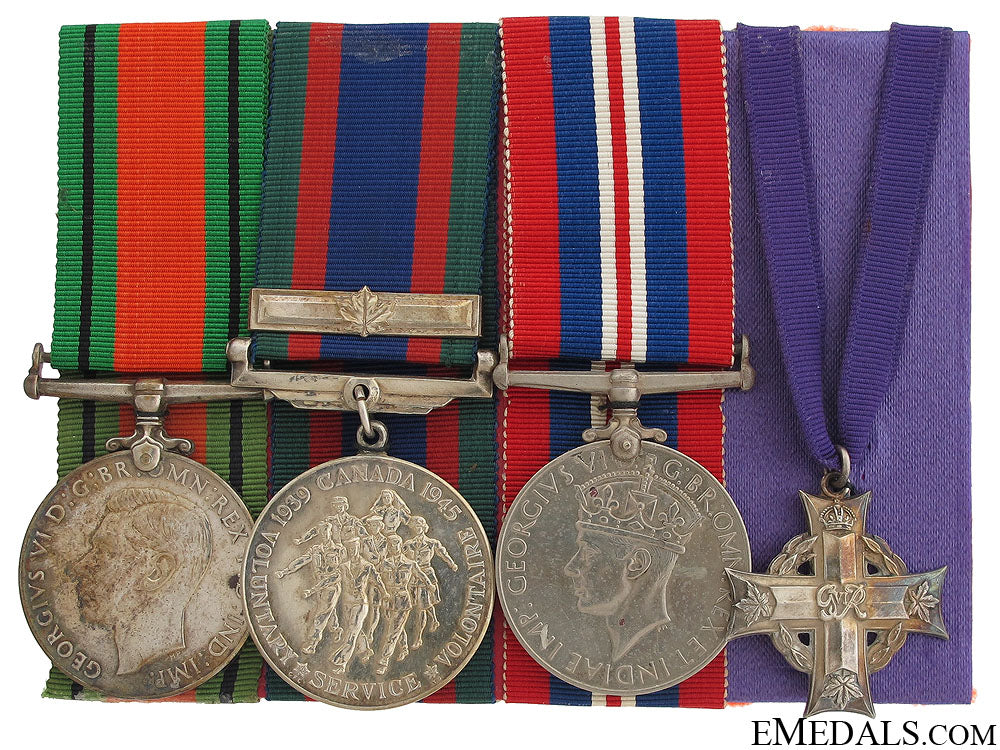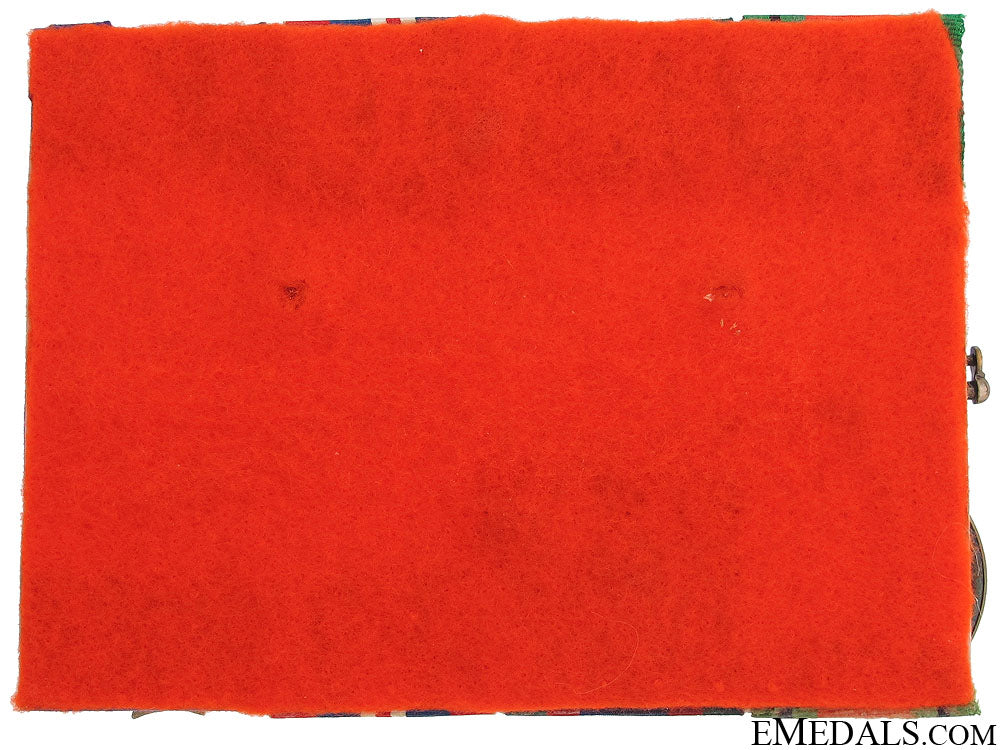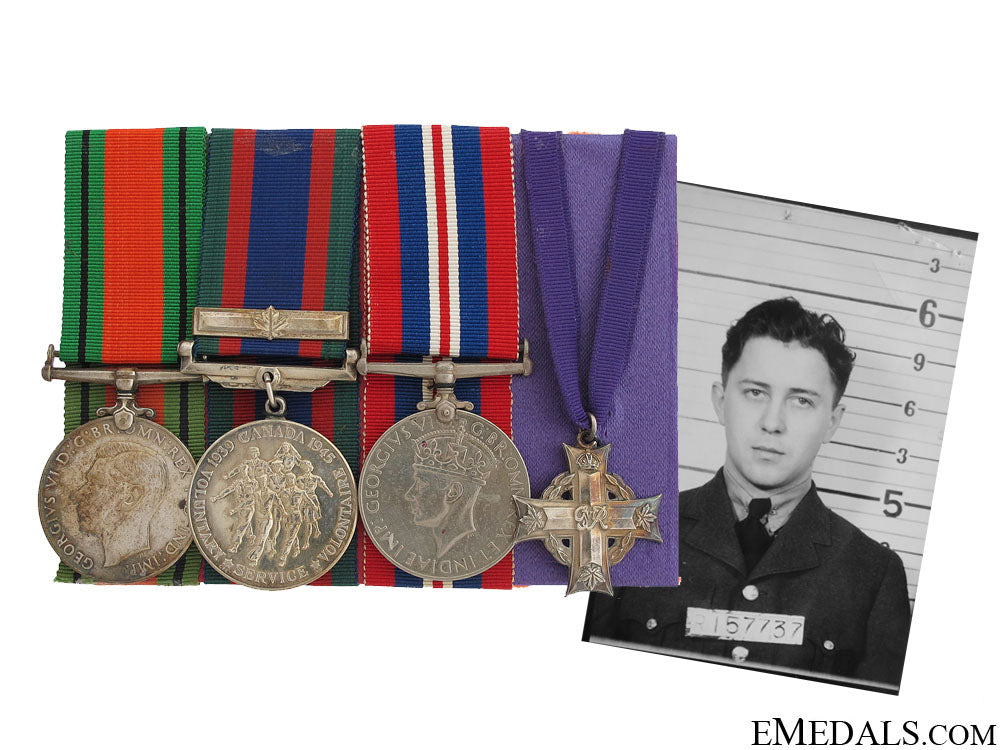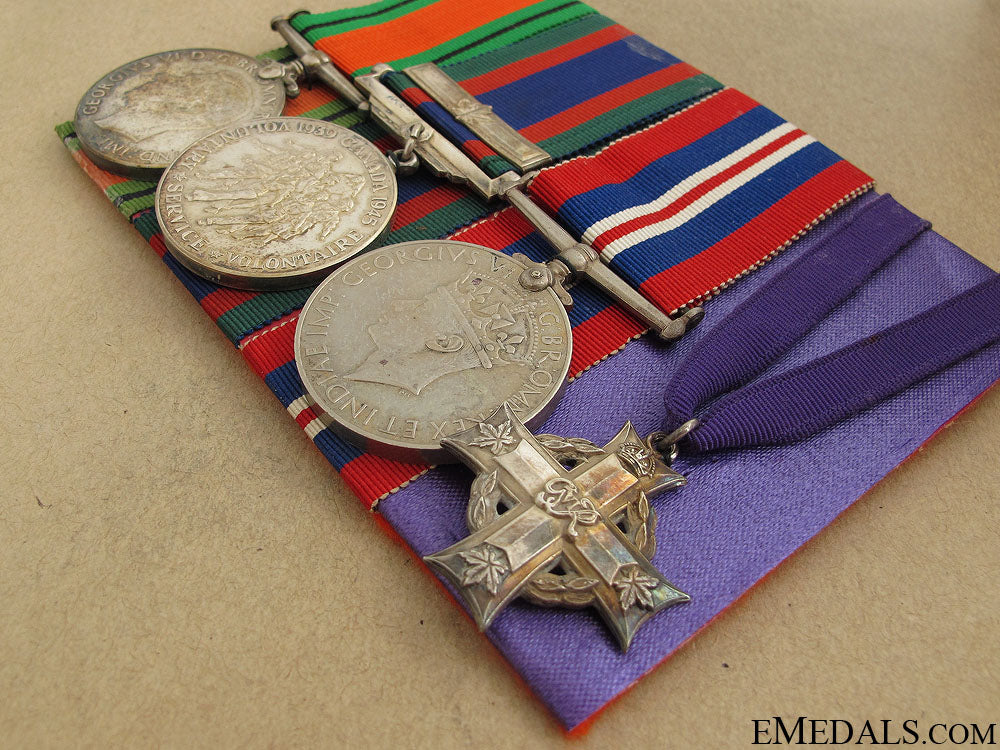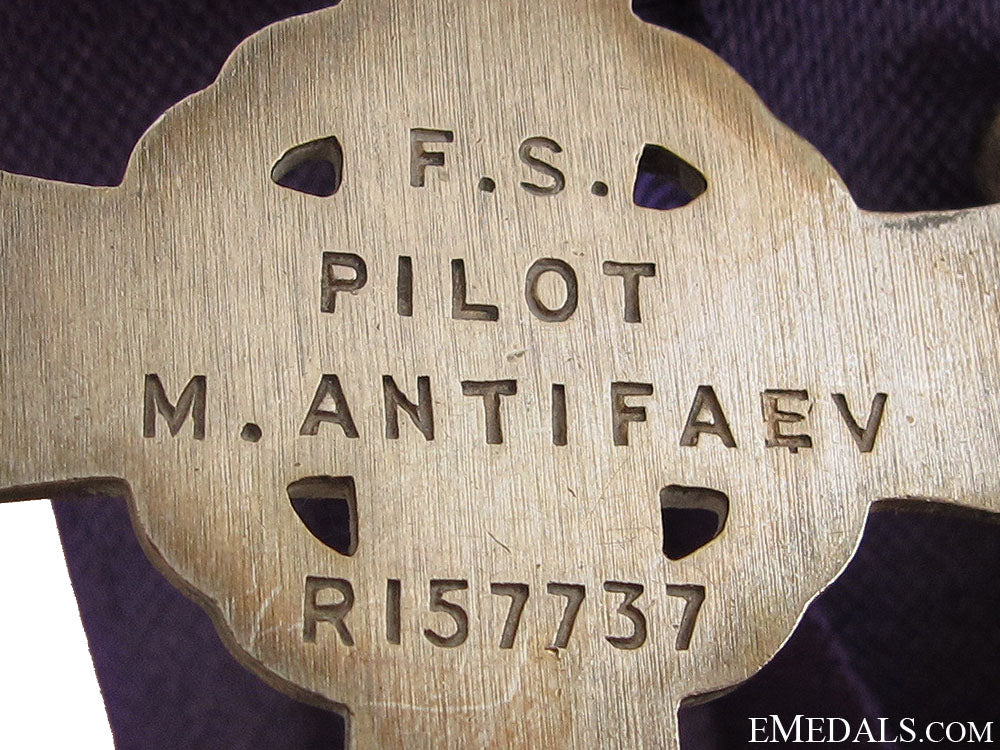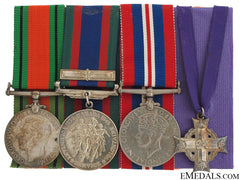Description
Defence Medal; Canadian Voluntary Service Medal with Overseas Clasp; 1939-45 War Medal; and Memorial Cross, George VI (F.S. PILOT M. ANTIFAEVR157737). Naming is officially engraved on the MC, the medals are unnamed. Original ribbons, court mounted without pinback, extremely fine. Accompanied by a CD containing thirty-six pages with copies of his Service Award Computer Card, Attestation Paper, Service Records, RCAF Certificate of Presumption of Death, Province of British Columbia Registration of Death, along with his father, Nicholas Antifaev's Province of British Columbia Certificate of Death, plus a photograph on Michael Antifaev in uniform.
Footnote: Michael Antifaev was born on March 1, 1921 at Kamsack, Saskatchewan, the son of Nicholas Antifaev and Annie Antifaev (nee Olkovick). Both his father and mother were born in Russia (he at Tiflis, she at Charcoff) and had become Canadian citizens. Michael had three brothers (K45129 Cfn. John Antifaev RCEME, Walter, Nicholas Jr.) and two sisters (Mrs. Mary Fraser, Mrs. Ann Layich). He lived in Saskatchewan for the first eighteen months of his life, before his parents moved to British Columbia, where he was to spend the next nineteen and a half years, his interests lying in fishing, hunting, softball, track and soccer. His education consisted of: Strathcona Public School (1927-1930), Sir Alexander Mackenzie School (1930-1935) and John Oliver High School (1935-1937, where he achieved Grade XI). He was employed in three occupations in his civilian life: as a Cutter with Queen Charlotte Fisheries for two years (1937-1939), as a Machine Operator with Westminster Shock Mills for one year (1940-1941) and as a Helper with Smith Sheet Metal (1941), until he enrolled in the W.E.T.P. (War Emergency Training Plan) from December 1941 to March 1942, a program designed to raise the quality of general knowledge for those people who had left school at a young age, covering the core "school" subjects so that they were prepared for more specific RCAF subjects once they were enlisted. He enlisted at the No. 1 Recruiting Centre in Vancouver, British Columbia, signing his RCAF Attestation Paper on December 15, 1941 and posted to No. 3 Manning Depot in Edmonton, Alberta, naming his next-of-kin as his father, Nicholas Antifaev, stating that he had no previous military service, that he was single and that his occupation was that of Sheet Metal Worker. In his RCAF Interview Report, dated March 17, 1942, three officers filed their reports on Antifaev. The Personnel Officer stated that his "A to L test score satisfactory when taken. Education now satisfactory. Should make average aircrew." and recommended him for "P and O". The Medical Officer noted that he was a "slow, non-aggressive type. Conscientious, dependable." and recommended him for "all aircrew duties." The Interviewing Officer noted that Antifaev "does not impress as a particularly good prospect. Borderline, English is not good. He should improve under training.", yet recommended him for "Pilot". He began his RCAF life as an Aircraftman 2nd Class at No. 5 Military Depot at Edmonton on Mar. 18, 1942, as part of the British Commonwealth Air Training Plan (BCATP), training in Canada for the next year. He was transferred to No. 3 SFTS at Calgary, Alberta on May 9, 1942, then to No. 7 ITS at Saskatoon, Saskatchewan on June 7, 1942, where he was hospitalized for two days (June 18 to 20) with an undisclosed illness and promoted to Leading Aircraftman on July 31st. He was later transferred to No. 19 EFTS at Virden, Manitoba on September 12, 1942, then to No. 11 SFTS at Yorkton, Saskatchewan on November 8, 1942, where he was named Temporary Sergeant and awarded his Pilot's Flying Badge on March 5, 1943. At this point, he was prepared for continued training overseas service, transferred to No. 1 "Y" Depot at Halifax, Nova Scotia two weeks later, on March 19, 1943, as part of the Royal Air Force Training Programme. Antifaev embarked Canada on March 28th, disembarking in the United Kingdom on April 4th and posted to 3 PRC on the 5th. He was moved around for training purposes for the next six months: to No. 15 (P) AFU on June 8, 1943, the attended No. 50 Group (Pool) on July 20, 1943, attended Ramsbury on July 27th, before settling at No. 20 Operational Training Unit on August 17, 1943. It was here that he was promoted to Temporary Flying Sergeant on September 5th. He had left No. 20 Operational Training Unit at RAF Lossiemouth in Moray, Scotland, on October 20, 1943, aboard a Vickers Wellington III aircraft DF.595, with Hercules XI engines, the plane having had a total number of 61.40 hours in the air, carrying a crew of six "Pupils" (R157737 Sergeant M. Antifaev (Pilot), J25518 A/B M.E. O'Donoghue (Pilot Officer), R155911 Sergeant R.M. McEachern (Navigator), 1320026 Sergeant G.F. Snell (2nd Navigator), 1432765 Sergeant J. Branford (Wireless Telegrapher/Air Gunner) and 1566671 Sergeant A. Davidson (Air Gunner)) on a cross-country training exercise, when the aircraft went down in the sea off Carlisle, Scotland. In the Report on Flying Accident or Forced Landing Not Attributable to Enemy Action, dated October 21, 1943, it noted that the aircraft was on a non-operational, night-time mission for training purposes. Antifaev was declared "Missing" and later "Presumed Dead", the date of death indicated as October 21, 1943. In an Investigative Report, dated May 8, 1944, it stated that "No. 20 O.T.U. reported that Wellington aircraft, DF.595, with a crew of 6, failed to return from an air training flight. It left base to carry out a night cross-country flight, on the following course: Base - Stirling - Goole - Carlisle - MacDuff - Base. The aircraft set course at 22.23 hours, on the 20th. October, 1943, and kept good W/T contact with the ground until 02.01 hours, on the 21st. October, 1943. At this time, a fix showed that it was approximately in the Inverness area about 30 miles west of its course. When it did not arrive over base shortly after this fix, No. 13 Group were requested as to its possible location and gave its position as at Butt-of-Lewis, at 03.21 bours, flying south. A message was than sent to the aircraft saying: "Land at Stornoway". No. 18 Group reported at 05.20 hours, that this aircraft had sent an S.O.S. at 03.15 hours, and at 03.30 hours, No. 13 Group reported that the plot of this aircraft faded in the Little Minch area, and the aircraft was believed to have ditched. Immediately after the ditching was suspected, No. 15 Group laid on their full Air-Sea rescue organization." It went on to note that "two not R.C.A.F. members of the crew (Snell and Branford of the RAF) were found in a dinghy alive, and from information received there is little likelihood of any of the remaining four members of this crew surviving." It was also "established that both engines were running and the aircraft under control at the time of "ditching"." One of the survivors indicated that "lack of oil" may have been a contributing factor, as the oil indicator light was on at 01.50 and during further pumping, the pump handle broke. Both RCAF officers, Antifaev and O'Donoghue were presumed dead, as were the other two members of the crew, McEachern and Davidson. Remarks by the Unit Commander substantiated the aforementioned, noting that the aircraft had a "Pupil Pilot as Captain" and that at "06.10 Although the search continued for a considerable time, no trace of the other four members of the Crew could be found." The official RCAF Certificate or Presumption of Death, Numbered 8111, dated June 23, 1944, states that R157737 Flight Sergeant Michael Antifaev died on October 21, 1943. He has no known grave and is remembered with honour on the Runnymede War Memorial in Englefield Green, Egham, Surrey, England. In his Will, dated March 20, 1942 at No. 3 Manning Depot in Edmonton, he stated that "I Give, Devise and Bequeath unto my father, Mr. N. Antifaev, Vancouver, B.C., all my Estate". The Estates Branch application was filled out and filed by his sister, Ann, on January 23, 1945, noting that Antifaev had been a "Tinsmith" in his civilian life, that there was an insurance policy with Prudential Life in the amount of $178.00, on a 20 year endowment, with the loss payable to his executors and that as far as she knew, he didn't have a Will, although one existed with the RCAF. In a Department of Veteran Affairs, Canadian Pension Commission Investigator's Report, dated October 18, 1950, the investigator noted that Antifaev's brother, Nicholas Antifaev Jr., applied for a Dependant's Allowance, as he was living with his mother, Annie, in a "run-down home" in Vancouver. The investigator noted that the brother, Nicholas Jr., was "a veteran having enlisted in 1942. He served in Canada only and was discharged in 1944 on medical grounds. He is not in receipt of any pension or benefits." The mother, Annie, had worked for Northwest Sack Co. for twenty-five years, earning $85.00 a month, with the father, Nicholas having died on November 6, 1949 in Vancouver, at the age of 62. The other two brothers and two sisters were all married and living away from home. The investigator came to the conclusion that "consideration should be given (to) Mrs. Annie Antifaev, mother of the deceased veteran, rather than the applicant" (Nicholas Jr.). In response, a letter from L.J. Carey, Secretary Dependent's Allowance Board, dated December 16, 1950, more than seven years after Michael Antifaev's death, he declared that all six relatives (mother, brothers, sisters) were not eligible for a Dependent's Allowance "during the period immediately prior to the date of the serving Member's death". Flight Sergeant (Pilot) Antifaev was entitled to the three medals presented here, as documented on his Service Award Computer Card. His mother, Annie, received his Memorial Cross on September 21, 1944.





